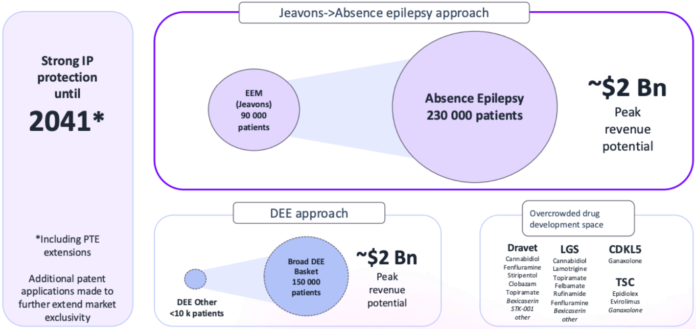Bright Minds Biosciences has announced the commencement of its Phase 2 clinical trial for BMB-101.
On September 25th, the company will host an event to present further details of the BREAKTHROUGH clinical trial. The event will include epilepsy Key Opinion Leaders (KOLs) who will discuss the unmet needs in epilepsy treatment.
BMB-101 is the first 5-HT2C agonist in clinical development, specifically designed to target therapeutic pathways through G-protein signaling.
Bright Minds Biosciences announces a Key Opinion Leader (KOL) event featuring leading epilepsy experts, Dr. Dennis Dlugos, Dr. Joe Sullivan, and Dr. Jo Sourbron. These specialists will provide valuable insights into the evolving challenges of drug-resistant seizures and unmet needs in epilepsy treatment. The event will also explore the scientific innovations behind the recently launched Phase 2 BREAKTHROUGH clinical trial, highlighting the potential for novel therapies in this critical area.
Bright Minds Biosciences (DRUG) is at the forefront of biotechnology, pioneering cutting-edge treatments for neurological and psychiatric disorders. With a focus on conditions that currently lack effective therapies, such as epilepsy, depression, and other central nervous system (CNS) disorders, Bright Minds is driven to deliver transformative solutions that have the potential to change patients’ lives.
The company’s innovative approach is centered on a platform of highly selective serotonergic agonists, carefully designed to target specific receptors in the brain. This has led to a robust pipeline of novel chemical entities (NCEs), promising breakthroughs in both neurology and psychiatry.
About the Conference
Important Information
Registration: Advance registration required. Replay available at Livestorm.
Q&A: Submit questions via the webcast portal or email info@brightmindsbio.com.
Featured KOL Speakers
Dr. Dennis J. Dlugos, MD, MSCE, is a professor of neurology and pediatrics at Children’s Hospital of Philadelphia and the University of Pennsylvania. He specializes in pediatric epilepsy and has published extensively in top journals like Neurology and Pediatric Neurology.
Dr. Joseph Sullivan is the director of the UCSF Pediatric Epilepsy Center, focusing on refractory epilepsy and genetic conditions like Dravet syndrome. He serves on multiple advisory boards, including the Dravet Syndrome Foundation.
Dr. Jo Sourbron, MD, PhD, is a physician scientist at UZ Ghent and KU Leuven in Belgium, with a research focus on drug-resistant epilepsy. He has led trials on innovative therapies, including serotonergic compounds and cannabidiol.
Why Investing in Bright Minds?
Bright Minds Biosciences (NASDAQ: DRUG) currently holds a market capitalization of around $5 million, a valuation that seems notably low given its potential for growth in the neurological and psychiatric disorder treatment sector. For comparison, Longboard Pharmaceuticals (NASDAQ: LBPH), a direct competitor in the same space, boasts a significantly higher market cap of approximately $1.4 billion. Both companies are focused on developing treatments for epilepsy, specifically through targeting the 5-HT2C receptor.
While Longboard has successfully completed Phase 2 clinical trials for its leading drug candidate, LP352, Bright Minds is now entering Phase 2 trials for its promising lead candidate, BMB-101. BMB-101, which is fully funded through this stage of development, shows great potential in addressing unmet needs in epilepsy treatment. Despite being slightly behind Longboard in the clinical process, the vast difference in market valuations—Longboard’s cap being 144 times higher—illustrates a significant disparity in how the market perceives their futures.
Market Discrepancy: Bright Minds is significantly undervalued compared to its direct competitor Longboard Pharmaceuticals, despite similar therapeutic focus and mechanisms of action.
Clinical Development: Longboard is further along in its clinical journey, having completed Phase 2 trials, while Bright Minds is initiating Phase 2 for BMB-101.
Funding Secured: Bright Minds has secured funding to support the full progression of BMB-101 through Phase 2 trials, positioning it for potential future growth.
The significant valuation gap highlights the potential investment opportunity for Bright Minds Biosciences as it moves forward with its clinical developments in the epilepsy treatment space.
Bright Minds Biosciences (NASDAQ: DRUG) has officially initiated a Phase 2 clinical trial for its lead candidate, BMB-101, aimed at treating a variety of drug-resistant epilepsy disorders, especially those with significant unmet medical needs. These conditions often leave patients with few treatment options, highlighting the critical need for innovative therapies. BMB-101 is a novel, highly selective 5-HT2C agonist that differentiates itself from traditional treatments through its use of G-protein biased agonism, a targeted approach that enhances its mechanism of action. This allows for improved chronic dosing, potentially offering greater efficacy and a better safety profile for long-term treatment, which is vital for managing chronic conditions like epilepsy.
Targeted Approach: BMB-101 utilizes G-protein biased agonism for more precise targeting, enhancing its potential for long-term use in chronic conditions.
Novel Mechanism: The selective 5-HT2C agonist offers a distinct advantage over traditional therapies, addressing limitations in existing treatment options.
Focus on Drug-Resistant Epilepsy: The trial specifically targets epilepsy disorders with limited therapeutic options, filling a critical gap in patient care.
Robust Financial Backing: Bright Minds has secured funding that extends through 2026, ensuring the company can thoroughly conduct trials and gather essential data.
With a strong financial runway supporting its progress, Bright Minds is well-positioned to advance the clinical trial of BMB-101. This financial security enables the company to focus on obtaining key data readouts while maintaining the time necessary to rigorously evaluate the candidate’s performance in treating epilepsy.





